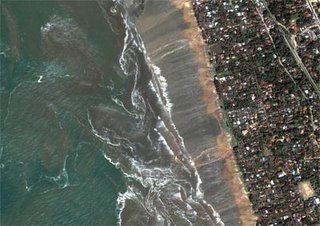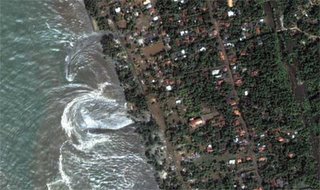
وَالنَّازِعَاتِ غَرْقًا (1) وَالنَّاشِطَاتِ نَشْطًا (2) وَالسَّابِحَاتِ سَبْحًا
(3) فَالسَّابِقَاتِ سَبْقًا (4) فَالْمُدَبِّرَاتِ أَمْرًا (5) يَوْمَ تَرْجُفُ الرَّاجِفَةُ
(6) تَتْبَعُهَا الرَّادِفَةُ
So here is what I believe to be reference to Tsunamis and a detailed explanation as well.
I will explain each word unless it is pretty obvious like in the third verse/ayah "سابحات سبحاٌٌ" "Saabihaat sabhaa" or "Saabi7aat Sab7aa" . Which means those which swim.
OK let me start with the first Ayah as in the picture on the left and the text above.
Al-Naazi3aat / Naazi'aat "نازعات" This comes from the root naza'a or naza3ah. Which means to rip off/peel/extract or take off something. It usually indicates that something is taken off/extracted while leaving another behind. So in Iraqi we would say "Inza3 thawbak" "Take of your shirt". That is also used in the Quran in other places I will name 3:
1- Soorat Al-A3raaf(7) ayah 108نَزَعَ يَدَهُ فَإِذَا هِيَ بَيْضَاءُ لِلنَّاظِرِينَ ":
2- Soorat Al-A3raaf(70 ayah 27: يَا بَنِي آَدَمَ لَا يَفْتِنَنَّكُمُ الشَّيْطَانُ كَمَا أَخْرَجَ أَبَوَيْكُمْ مِنَ الْجَنَّةِ يَنْزِعُ عَنْهُمَا لِبَاسَهُمَا
3- Soorat Al-Ma3arij(70) ayah 16: "نَزَّاعَةً لِلشَّوَى "
Nazza3ah lil shawa means it peals of the skin. Now since there is only mention of the skin here, one would conclude that it leaves the bones behind. This is according to old interpretations for those skeptical Muslims.
As for the first example, it is telling the story of Moses when he had an encounter with God and God was teaching him how to perform miracles. God in this verse tells us that he Naza3/Naza' his hand, as in slipped it out. Which is the inverse so to speak of the clothes being peeled off. It still however supports the meaning of leaving something behind. While the second example is used in common Arabic today especially Iraqi which is to take-off.
Now comes the second word of the first verse. Gharqaa "غرقا " which comes from the root Gharaq, which is to drown or to submerge under water. Feel free to research those words at Sakhr.
Therefore, by putting those two words together we can see that God is talking about Those things which: Peal off, extract or rip off through submergence under water. Nazi3aat being a name given to a thing which performs the nazi3. "إسم فاعل " Which is an accurate description of what a Tsunamis main impact is. As described in previous posts Tsunamis might go by unnoticed until they hit the shore. Of course relative to the people on the shores the destruction may not seem like peeling, but if you think of the destruction relative to the wave it is but clearing out a thin layer.Below are some pictures I found on the Web to help you make the correlation . These pictures were taken via satellite before and after the 2004 Indian Ocean Tsunami hit.


Now comes the not so obvious part. I had a harder time understanding the second verse/ayah:
"والناشطات نشطا " since there is no other reference to it in the Quran. Naashitaat, comes from the root Nashata. Which has several meanings the most common usage is to be full of energy. Actually I can't think of an equivalent meaning in the English language. However, the Arabic Mo'jam has this to say
نَشَطَ - [ن ش ط]. (ف: ثلا. لازم، م. بحرف). نَشَطْتُ، أَنْشِطُ، اِنْشِطْ، مص. نَشْطٌ. 1."نَشَطَ مِنْ قَرْيَتِهِ" : خَرَجَ مِنْهَا، غَادَرَهَا. 2."يَنْشِطُ مِنْ بَلَدٍ إِلَى بَلَدٍ" : يَتَحَوَّلُ، يَنْتَقِلُ. 3."نَشَطَتْ بِهِ الْهُمُومُ" : أَزْعَجَتْهُ، أَرْهَقَتْهُ. 4."نَشَطَ الْمَسِيلُ" : خَرَجَ عَنِ الْجَادَّةِ وَتَفَرَّقَ يَمْنَةً وَيَسْرَةً.
Which I will try to translate to the best of my ability:
1- To leave and depart ones village
2- To travel from one country to another
3- To occupy ones mind
4- For liquid spill and/or depart in all directions.
As we can see this is an amazing accurate description of the ripple effect of a wave. We all know what happens when we throw a stone into water. We all know the ripple effect all too well. Water travels in all directions with little resistance to reach distant places. Please feel free to read about how far the 2004 Tsunami traveled from around Indonesia. The Indian Ocean Tsunami was said to have hit the Eastern Shores of South Africa. Here is a picture
The third ayah confirms that the traveling occurs in water. As Al-Saabi7aat Sab7aa suggests.
The fourth ayah I believe is where the description ends. This refers to the cause of a Tsunami rather than the description of it. Of course what could cause a Tsunami is anything from a landslide to an Earthquake or Volcano. Proof to my claim that this is not part of the description is the prefix "Fa" rather than "wa". Also the literal meaning Saabiqaat. That which precedes.
Now the fifth ayah I need help in understanding, but the literal meaning is "Those which make things happen". Which could support my claim that the Saabiqaat are nothing but which make the Tsunami happen. However, I am not certain.
The versus after that start talking about things that will happen at the end of times. We know from several other chapters in the Quran that at the end of days we will have unprecedented Earthquakes. Which would then mean that Al-Naazi3'aat are not one but many Tsunamis when the time comes for life to seize on earth.
In conclusion, I welcome any comments on this matter. I am but a man who I believe God has helped understand the Quran as the ayah suggests
"وَلَا تَعْجَلْ بِالْقُرْآنِ مِنْ قَبْلِ أَنْ يُقْضَى إِلَيْكَ وَحْيُهُ وَقُلْ رَبِّ زِدْنِي عِلْمًا"
So here is what I believe to be reference to Tsunamis and a detailed explanation as well.
I will explain each word unless it is pretty obvious like in the third verse/ayah "سابحات سبحاٌٌ" "Saabihaat sabhaa" or "Saabi7aat Sab7aa" . Which means those which swim.
OK let me start with the first Ayah as in the picture on the left and the text above.
Al-Naazi3aat / Naazi'aat "نازعات" This comes from the root naza'a or naza3ah. Which means to rip off/peel/extract or take off something. It usually indicates that something is taken off/extracted while leaving another behind. So in Iraqi we would say "Inza3 thawbak" "Take of your shirt". That is also used in the Quran in other places I will name 3:
1- Soorat Al-A3raaf(7) ayah 108نَزَعَ يَدَهُ فَإِذَا هِيَ بَيْضَاءُ لِلنَّاظِرِينَ ":
2- Soorat Al-A3raaf(70 ayah 27: يَا بَنِي آَدَمَ لَا يَفْتِنَنَّكُمُ الشَّيْطَانُ كَمَا أَخْرَجَ أَبَوَيْكُمْ مِنَ الْجَنَّةِ يَنْزِعُ عَنْهُمَا لِبَاسَهُمَا
3- Soorat Al-Ma3arij(70) ayah 16: "نَزَّاعَةً لِلشَّوَى "
Nazza3ah lil shawa means it peals of the skin. Now since there is only mention of the skin here, one would conclude that it leaves the bones behind. This is according to old interpretations for those skeptical Muslims.
As for the first example, it is telling the story of Moses when he had an encounter with God and God was teaching him how to perform miracles. God in this verse tells us that he Naza3/Naza' his hand, as in slipped it out. Which is the inverse so to speak of the clothes being peeled off. It still however supports the meaning of leaving something behind. While the second example is used in common Arabic today especially Iraqi which is to take-off.
Now comes the second word of the first verse. Gharqaa "غرقا " which comes from the root Gharaq, which is to drown or to submerge under water. Feel free to research those words at Sakhr.
Therefore, by putting those two words together we can see that God is talking about Those things which: Peal off, extract or rip off through submergence under water. Nazi3aat being a name given to a thing which performs the nazi3. "إسم فاعل " Which is an accurate description of what a Tsunamis main impact is. As described in previous posts Tsunamis might go by unnoticed until they hit the shore. Of course relative to the people on the shores the destruction may not seem like peeling, but if you think of the destruction relative to the wave it is but clearing out a thin layer.Below are some pictures I found on the Web to help you make the correlation . These pictures were taken via satellite before and after the 2004 Indian Ocean Tsunami hit.


Now comes the not so obvious part. I had a harder time understanding the second verse/ayah:
"والناشطات نشطا " since there is no other reference to it in the Quran. Naashitaat, comes from the root Nashata. Which has several meanings the most common usage is to be full of energy. Actually I can't think of an equivalent meaning in the English language. However, the Arabic Mo'jam has this to say
نَشَطَ - [ن ش ط]. (ف: ثلا. لازم، م. بحرف). نَشَطْتُ، أَنْشِطُ، اِنْشِطْ، مص. نَشْطٌ. 1."نَشَطَ مِنْ قَرْيَتِهِ" : خَرَجَ مِنْهَا، غَادَرَهَا. 2."يَنْشِطُ مِنْ بَلَدٍ إِلَى بَلَدٍ" : يَتَحَوَّلُ، يَنْتَقِلُ. 3."نَشَطَتْ بِهِ الْهُمُومُ" : أَزْعَجَتْهُ، أَرْهَقَتْهُ. 4."نَشَطَ الْمَسِيلُ" : خَرَجَ عَنِ الْجَادَّةِ وَتَفَرَّقَ يَمْنَةً وَيَسْرَةً.
Which I will try to translate to the best of my ability:
1- To leave and depart ones village
2- To travel from one country to another
3- To occupy ones mind
4- For liquid spill and/or depart in all directions.
As we can see this is an amazing accurate description of the ripple effect of a wave. We all know what happens when we throw a stone into water. We all know the ripple effect all too well. Water travels in all directions with little resistance to reach distant places. Please feel free to read about how far the 2004 Tsunami traveled from around Indonesia. The Indian Ocean Tsunami was said to have hit the Eastern Shores of South Africa. Here is a picture
The third ayah confirms that the traveling occurs in water. As Al-Saabi7aat Sab7aa suggests.
The fourth ayah I believe is where the description ends. This refers to the cause of a Tsunami rather than the description of it. Of course what could cause a Tsunami is anything from a landslide to an Earthquake or Volcano. Proof to my claim that this is not part of the description is the prefix "Fa" rather than "wa". Also the literal meaning Saabiqaat. That which precedes.
Now the fifth ayah I need help in understanding, but the literal meaning is "Those which make things happen". Which could support my claim that the Saabiqaat are nothing but which make the Tsunami happen. However, I am not certain.
The versus after that start talking about things that will happen at the end of times. We know from several other chapters in the Quran that at the end of days we will have unprecedented Earthquakes. Which would then mean that Al-Naazi3'aat are not one but many Tsunamis when the time comes for life to seize on earth.
In conclusion, I welcome any comments on this matter. I am but a man who I believe God has helped understand the Quran as the ayah suggests
"وَلَا تَعْجَلْ بِالْقُرْآنِ مِنْ قَبْلِ أَنْ يُقْضَى إِلَيْكَ وَحْيُهُ وَقُلْ رَبِّ زِدْنِي عِلْمًا"
No comments:
Post a Comment